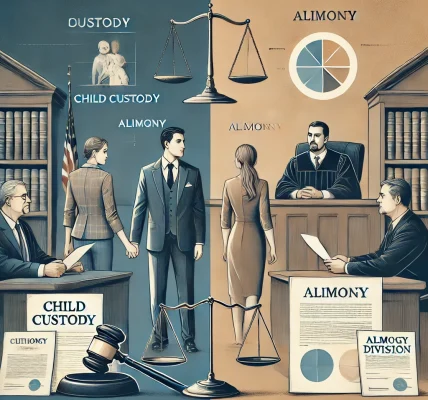When unmarried parents separate, child custody disputes can become complicated due to legal distinctions between married and unmarried parents. Understanding the legal rights of unmarried parents in child custody cases is crucial to ensuring the best interests of the child while protecting parental rights. This article explores the legal landscape surrounding child custody for unmarried parents, their rights, and how custody decisions are made.
Understanding Parental Rights for Unmarried Parents
Unlike married couples, unmarried parents do not automatically have the same legal presumptions when it comes to custody. For instance, in most jurisdictions:
- The biological mother is automatically granted custody at birth.
- The biological father must establish paternity to claim custody or visitation rights.
This distinction makes it necessary for unmarried fathers to take additional legal steps to secure their parental rights.
How Custody Is Determined for Unmarried Parents
When determining child custody arrangements, courts prioritize the child’s best interests over all other considerations. Key factors include:
1. Establishing Paternity
Before an unmarried father can claim legal custody or visitation rights, he must establish paternity. This can be done through:
- Signing a Voluntary Acknowledgment of Paternity at the hospital or later.
- Filing a paternity petition in court.
- Undergoing a DNA test if paternity is disputed.
2. Physical vs. Legal Custody
- Physical Custody: Determines where the child will live.
- Legal Custody: Grants the right to make important decisions about the child’s upbringing, such as education, healthcare, and religious upbringing.
3. Primary Caregiver Consideration
Courts often favor the parent who has been the child’s primary caregiver, providing daily care, emotional support, and a stable home environment.
4. Parental Stability and Fitness
Judges consider each parent’s ability to provide a safe and stable home, their mental and physical health, financial status, and any history of substance abuse or criminal activity.
5. Child’s Preference
In some cases, if the child is of sufficient age and maturity, their preference may influence the court’s decision.
6. Co-Parenting and Communication
Courts favor parents who demonstrate a willingness to work together and co-parent effectively. A history of conflict or lack of cooperation can impact custody decisions.
Custody Options for Unmarried Parents
Unmarried parents have several options for custody arrangements:
1. Sole Custody
- The child lives with one parent, who has full decision-making authority.
- The other parent may have visitation rights but no legal custody.
2. Joint Custody
- Both parents share decision-making responsibilities and, in some cases, physical custody.
- Requires cooperation and effective communication between parents.
3. Visitation Rights
- If one parent has sole custody, the non-custodial parent is typically granted visitation rights, unless deemed unfit by the court.
Legal Steps to Secure Custody Rights
For unmarried fathers seeking custody or visitation rights, the following steps are essential:
1. Establish Paternity
- If paternity is not legally recognized, a father must file for paternity to gain rights.
2. File for Custody or Visitation
- A father can petition the court for custody or visitation rights once paternity is established.
3. Create a Parenting Plan
- A well-structured plan outlining custody arrangements, visitation schedules, and decision-making authority can support the case.
4. Attend Mediation (if required)
- Some courts require parents to attempt mediation before proceeding with a custody trial.
5. Comply with Court Orders
- If a court grants custody or visitation rights, it is crucial to adhere to the order to maintain legal standing.
Challenges Unmarried Parents May Face
1. Bias Towards Mothers
- Courts historically favored mothers in custody cases, but laws are changing to provide equal consideration for fathers.
2. Difficulty Establishing Paternity
- If a mother disputes paternity, fathers may face delays in obtaining legal rights.
3. Disagreements Over Custody Arrangements
- If parents cannot agree, a court will decide based on the child’s best interests.
Frequently Asked Questions (FAQs)
Q1: Can an unmarried father get full custody?
A: Yes, if the court finds that it is in the child’s best interest and that the mother is unfit or unable to provide adequate care.
Q2: Does an unmarried father have to pay child support?
A: Yes, once paternity is established, both parents are legally responsible for financially supporting the child.
Q3: Can a mother deny visitation if the father has established paternity?
A: No, if a court has granted visitation rights, the mother must comply with the order. The father can seek enforcement through legal channels.
Q4: How can an unmarried parent modify a custody order?
A: Either parent can request a modification by demonstrating a significant change in circumstances that affects the child’s best interests.
Conclusion
Unmarried parents have legal rights in child custody cases, but fathers must take extra steps to establish paternity and secure their parental rights. Courts focus on the child’s best interests, ensuring that custody arrangements support their well-being. Understanding the legal process and working towards cooperative co-parenting can result in the best outcome for both parents and, most importantly, the child. If you are facing a child custody dispute as an unmarried parent, seeking legal guidance can help navigate the complexities of family law and protect your parental rights.



